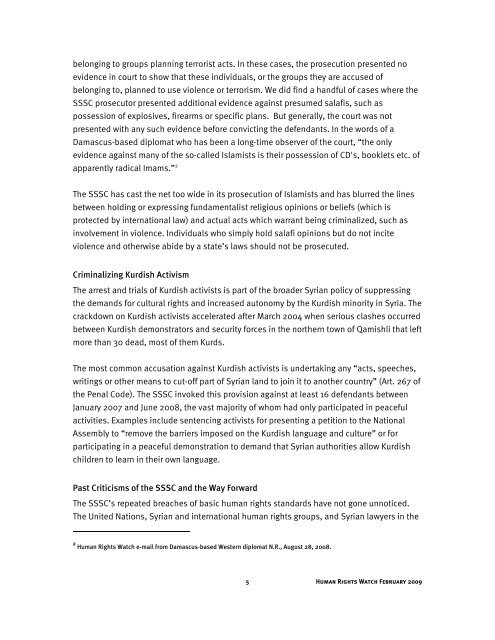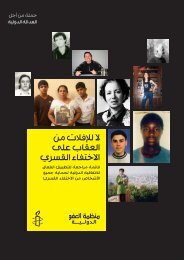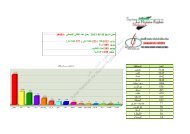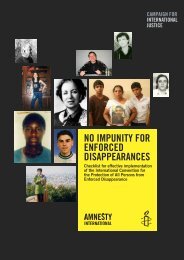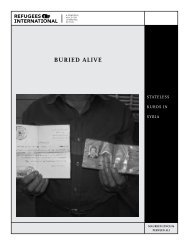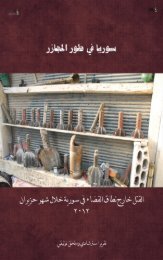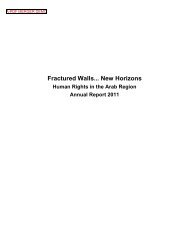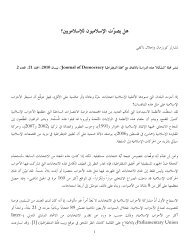elonging to groups planning terrorist acts. In these cases, the prosecution presented noevidence in court to show that these individuals, or the groups they are accused ofbelonging to, planned to use violence or terrorism. We did find a handful of cases where theSSSC prosecutor presented additional evidence against presumed salafis, such aspossession of explosives, firearms or specific plans. But generally, the court was notpresented with any such evidence before convicting the defendants. In the words of aDamascus-based diplomat who has been a long-time observer of the court, “the onlyevidence against many of the so-called Islamists is their possession of CD's, booklets etc. ofapparently radical Imams.” 2The SSSC has cast the net too wide in its prosecution of Islamists and has blurred the linesbetween holding or expressing fundamentalist religious opinions or beliefs (which isprotected by international law) and actual acts which warrant being criminalized, such asinvolvement in violence. Individuals who simply hold salafi opinions but do not inciteviolence and otherwise abide by a state’s laws should not be prosecuted.Criminalizing Kurdish ActivismThe arrest and trials of Kurdish activists is part of the broader Syrian policy of suppressingthe demands for cultural rights and increased autonomy by the Kurdish minority in Syria. Thecrackdown on Kurdish activists accelerated after March 2004 when serious clashes occurredbetween Kurdish demonstrators and security forces in the northern town of Qamishli that leftmore than 30 dead, most of them Kurds.The most common accusation against Kurdish activists is undertaking any “acts, speeches,writings or other means to cut-off part of Syrian land to join it to another country” (Art. 267 ofthe Penal Code). The SSSC invoked this provision against at least 16 defendants betweenJanuary 2007 and June 2008, the vast majority of whom had only participated in peacefulactivities. Examples include sentencing activists for presenting a petition to the NationalAssembly to “remove the barriers imposed on the Kurdish language and culture” or forparticipating in a peaceful demonstration to demand that Syrian authorities allow Kurdishchildren to learn in their own language.Past Criticisms of the SSSC and the Way ForwardThe SSSC’s repeated breaches of basic human rights standards have not gone unnoticed.The United Nations, Syrian and international human rights groups, and Syrian lawyers in the2 <strong>Human</strong> <strong>Rights</strong> <strong>Watch</strong> e-mail from Damascus-based Western diplomat N.R., August 28, 2008.5 <strong>Human</strong> <strong>Rights</strong> <strong>Watch</strong> February 2009
past repeatedly have criticized the SSSC. For example, the UN <strong>Human</strong> <strong>Rights</strong> Committee, thebody charged with monitoring states’ compliance with the ICCPR, stated in 2005 that SSSCprocedures are incompatible with the provisions of the ICCPR. Writing 13 years ago about theSSSC, <strong>Human</strong> <strong>Rights</strong> <strong>Watch</strong> also noted that “defendants prosecuted in the state securitycourt are denied their right under international law to a fair and public trial by a competent,independent and impartial tribunal.” 3Western diplomats who began observing trials at the SSSC since 2004 also have been highlycritical of the SSSC and its president, Fayez al-Nuri, in private conversations with <strong>Human</strong><strong>Rights</strong> <strong>Watch</strong>. A Western diplomat, who has frequently attended the SSSC proceedings overthe last three years, told <strong>Human</strong> <strong>Rights</strong> <strong>Watch</strong>:I have never seen al-Nuri really look at a file. He basically tells the defendant,“this is the charge, what do you have to say?” As the defendant speaks, hemay suddenly say, “enough!” The prosecutor never asks questions. He mightadd a comment or share a joke with al-Nuri. 4According to another diplomat, “short of disbanding the court, there is no way to improve aninstitution whose very existence is antithetical to human rights.” 5<strong>Human</strong> <strong>Rights</strong> <strong>Watch</strong> agrees with this assessment. The scope of violations committed by theSSSC and the Syrian authorities’ enduring refusal to reform it mean that this institutionshould be dissolved. The Syrian authorities should release defendants facing prosecutionsolely for their non-violent expression or association. It should transfer cases where there isevidence that a defendant committed recognizable criminal offenses to regular criminalcourts and ensure that these defendants receive a fair trial in accordance with internationalhuman rights standards. In addition, the Syrian judiciary should investigate the numerousallegations of torture at the hands of the security services and reject any forced coercions.The timing is opportune to dissolve the SSSC since the authorities suspended trials beforethe SSSC since July 2008. The government should make permanent this temporarysuspension; it also should immediately reveal information on the fate of the detainees inSednaya.3 <strong>Human</strong> <strong>Rights</strong> <strong>Watch</strong>/Middle East, Syria –The Price of Dissent, vol. 7, no. 4, July 1995, p. 4.4 <strong>Human</strong> <strong>Rights</strong> <strong>Watch</strong> interview with Damascus-based Western diplomat C.D., Beirut, April 14, 2008.5 <strong>Human</strong> <strong>Rights</strong> <strong>Watch</strong> e-mail from Damascus-based Western diplomat A.H., August 15, 2008.<strong>Far</strong> <strong>From</strong> <strong>Justice</strong> 6
- Page 1 and 2: SyriaFar From JusticeSyria’s Supr
- Page 3 and 4: Copyright © 2009 Human Rights Watc
- Page 6 and 7: I. SummaryIt is not really a judici
- Page 8 and 9: denies lawyers the opportunity to e
- Page 12 and 13: The Syrian authorities have demonst
- Page 14 and 15: conducted interviews with them over
- Page 16 and 17: The decisions of the SSSC cannot be
- Page 18 and 19: With the exception of a few cases,
- Page 20 and 21: of a court session when the detaine
- Page 22 and 23: silent, and only the judge and mukh
- Page 24 and 25: parties other than the ruling Ba`at
- Page 26 and 27: In subsequent years, the SSSC has r
- Page 28 and 29: possession of CD's, booklets etc. o
- Page 30 and 31: Ocalan was based in Damascus, and t
- Page 32 and 33: IV. The SSSC’s Recent Activities:
- Page 34 and 35: November 4, 2007November 11, 2007No
- Page 36 and 37: A third detainee sentenced by the S
- Page 38 and 39: interpreted narrowly, with terms su
- Page 40 and 41: eputation of the country,” conclu
- Page 42 and 43: anything. The judge said they will
- Page 44 and 45: not note any additional evidence pr
- Page 46 and 47: democracy.” 138 The sentencing wa
- Page 48 and 49: state’s laws are not criminals. A
- Page 50 and 51: After signing, they took us to `Adr
- Page 52 and 53: “belonging to a secret organizati
- Page 54 and 55: Muslim Brotherhood. Syrian security
- Page 56 and 57: Another diplomat saw additional adv
- Page 58 and 59: With respect to the legal system•
- Page 60 and 61:
With respect to Syria’s more gene
- Page 62 and 63:
IX. AppendicesAnnex I - List of Jud
- Page 64 and 65:
Shirzad bin27Muhammad SamiBakrNear
- Page 66 and 67:
505152535455565758596061Muhammad Ah
- Page 68 and 69:
747576777879808182Wasim MuhammadJam
- Page 70 and 71:
102`Abd al-Khubar`Alawi bin Ahmadb.
- Page 72 and 73:
135Ahmad al-`Ujaylb. 1982Deir al-Zu
- Page 74 and 75:
16316416516616716816917017117217317
- Page 76 and 77:
196197Jam`a bin Hussain al-ShahadaY
- Page 78 and 79:
228Jamal Nab`a binHassanUnknown 25-


